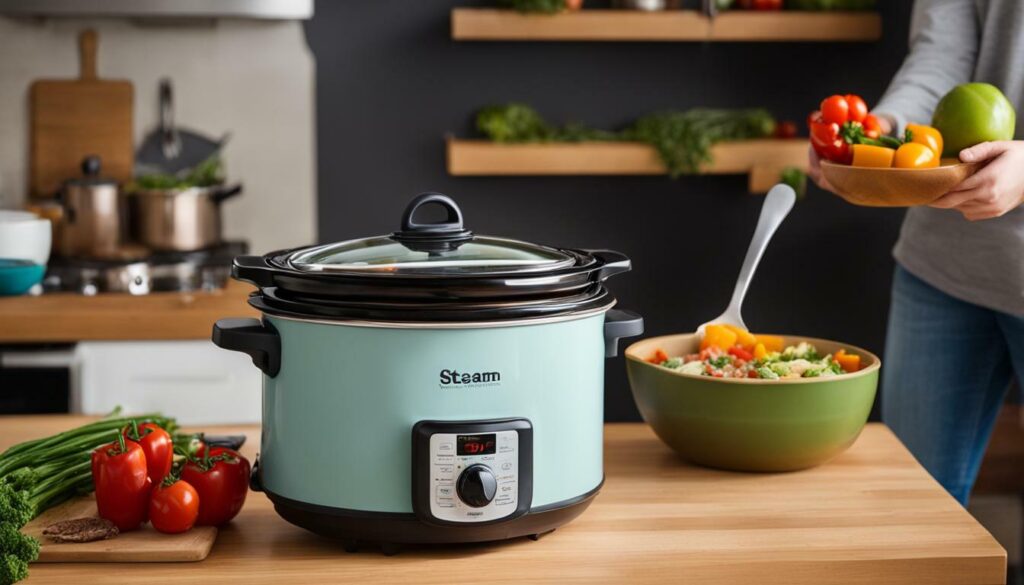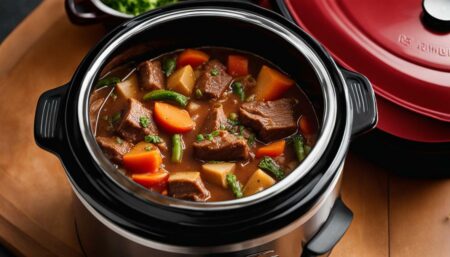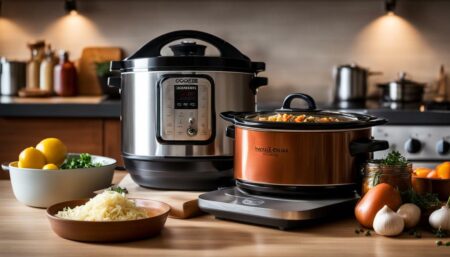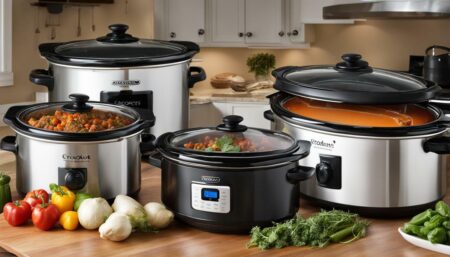When it comes to energy usage in the kitchen, small slow cookers are a great eco-friendly option. These compact appliances are designed to consume low energy while providing convenient and efficient cooking solutions. In this section, we will delve into the energy efficiency of small slow cookers, exploring their benefits and how they compare to other kitchen appliances.
Key Takeaways:
- Small slow cookers are an energy-efficient option for cooking in the kitchen.
- These compact appliances are designed to consume low energy while still providing excellent cooking performance.
- Compared to traditional cooking methods, small slow cookers provide overall energy savings in the kitchen.
- Using a small slow cooker can contribute to a more sustainable lifestyle and help reduce your carbon footprint.
- Optimizing energy efficiency while cooking with a slow cooker can be achieved through proper ingredient preparation and utilizing energy-saving features.
Understanding Small Slow Cookers
Small slow cookers are a popular kitchen appliance that provides a convenient and space-saving solution for cooking meals. These compact appliances are designed to fit comfortably in smaller kitchens while still delivering excellent cooking performance. They are perfect for preparing soups, stews, casseroles, and many other dishes, with the added benefit of low energy consumption.
Unlike larger slow cookers, which can take up a significant amount of counter space, small slow cookers are specifically designed for smaller households. They typically have a capacity of 1-2 quarts, making them perfect for meals that serve 2-3 people. Their compact size also makes them ideal for potlucks, small gatherings, and meal-prepping for the week ahead.
Small slow cookers are often referred to as “compact slow cookers” or “small kitchen appliances” because they take up very little space. They can be easily stored in a cabinet or on a shelf when not in use, which is a huge benefit for those with limited kitchen storage. Additionally, many small slow cookers feature removable stoneware inserts, making them easy to clean and maintain.
Energy Usage in Slow Cookers
Slow cookers are renowned for their low energy consumption and energy-saving capabilities. These kitchen appliances are designed to minimize energy usage while delivering convenient and delicious meals. Traditional cooking methods, such as ovens and stovetops, often consume a significant amount of energy, but slow cookers operate on lower wattages, resulting in lower energy consumption and reduced costs.
Low energy consumption Crock-Pots offer several benefits, including reduced environmental impact and cost savings. Using a slow cooker can significantly reduce your energy usage in the kitchen and contribute to an eco-friendly lifestyle. In addition, slow cookers are energy-saving kitchen appliances that allow you to cook your favorite meals with minimal effort, making them an excellent addition to any home.
Energy-saving cooking devices such as slow cookers are an essential part of a sustainable lifestyle. These appliances consume less energy, reduce environmental impact, and contribute to overall energy conservation efforts. Slow cookers are designed to operate on low wattages, making them an ideal energy-efficient kitchen appliance.
Whether you’re cooking for one or feeding a family, using a slow cooker is an excellent way to reduce energy usage and minimize your carbon footprint. With their energy-saving capabilities, small slow cookers are an excellent addition to any kitchen looking to become more eco-friendly.
Energy Efficiency Features
Small slow cookers are designed with energy efficiency in mind, utilizing various features to optimize energy usage. These appliances are energy-saving cooking devices that can contribute to sustainable kitchen practices. Here are some energy-saving features you can find in an energy-efficient slow cooker:
| Feature | Description |
|---|---|
| Programmable Timers | With a programmable timer, you can set your slow cooker to turn on or off at specific times, ensuring that your dish is ready to eat when you need it without wasting energy. |
| Temperature Control | The temperature control feature allows you to adjust the temperature of your slow cooker to suit the dish you are cooking, preventing overcooking and saving energy. |
| Insulation | Energy-efficient slow cookers are typically well-insulated, meaning they can retain heat more effectively, thus reducing the amount of energy needed to keep your food warm. |
By incorporating these energy efficiency features, small slow cookers can offer an eco-friendly slow cooker option that requires less energy than traditional cooking methods. Not only does it help you save money on your utility bills, but it also helps reduce your carbon footprint.
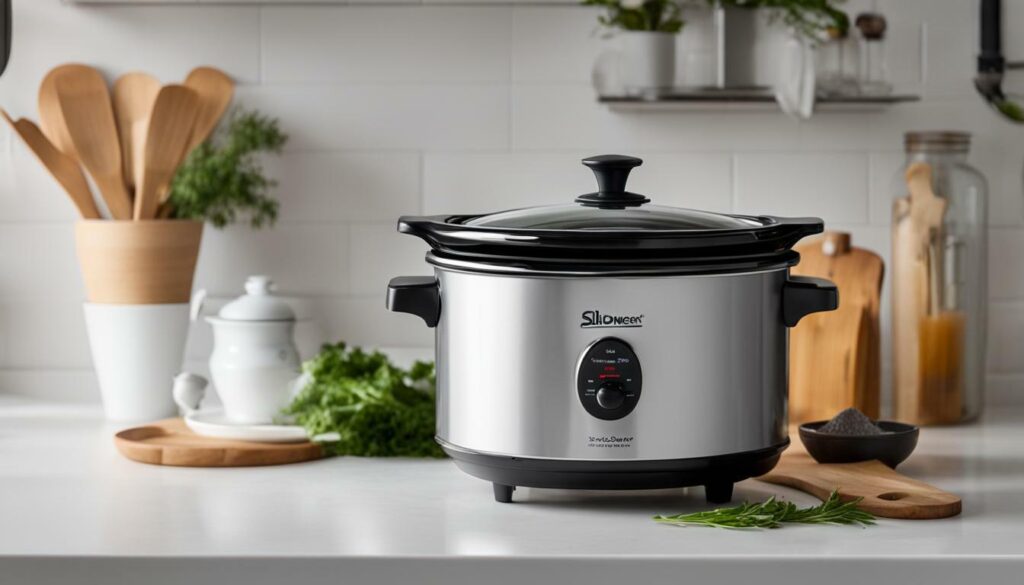
According to Energy Star, slow cookers use roughly the same amount of energy as a standard light bulb, making them an energy-saving cooking device.
Energy-efficient cooking doesn’t have to be complicated, and small slow cookers are a great example of this. These appliances showcase that energy-efficient cooking can be both simple and delicious. By utilizing these features in an energy-efficient slow cooker, you can reduce your energy usage and contribute to a more sustainable lifestyle.
Factors Affecting Energy Consumption
While slow cookers are generally designed to consume low energy, certain factors can still impact their energy usage. To ensure maximum energy efficiency, consider the following:
- Use the right cooking settings: Most slow cookers have different settings such as high, low, and warm. Using the appropriate setting for your recipe can make a significant difference in energy usage.
- Proper ingredient preparation: Chopping ingredients into smaller pieces can help them cook faster, reducing the amount of time the slow cooker needs to be on.
- Maximizing energy efficiency: Slow cookers are most efficient when they’re full. Preparing the right amount of food for your slow cooker can help you maximize its energy efficiency.
By taking these small steps, you can ensure that your slow cooker is working at maximum energy efficiency, reducing your energy usage and making it an eco-friendly appliance.
Comparing Energy Usage with Other Appliances
When it comes to energy usage, small slow cookers are a smart choice for any kitchen. These compact appliances are designed to consume low energy while providing high-quality cooking results.
In comparison to other kitchen appliances, small slow cookers use significantly less energy. For example, a conventional oven typically uses around 2400 watts per hour, while a small slow cooker typically uses around 100 watts per hour. This means that slow cookers are a great choice for recipes that require long cooking times, as they can provide delicious results without significantly adding to your energy bill.
Compared to stovetops, small slow cookers are also more energy-efficient. A stovetop burner typically uses around 1000-3000 watts per hour, while a slow cooker uses only 100 watts per hour. This means that slow cookers are a great choice for recipes that require low and slow cooking, as they use much less energy than other cooking methods.
Even compared to a microwave, small slow cookers are an energy-saving kitchen appliance. A microwave uses around 1200 watts per hour, while a small slow cooker uses only 100 watts per hour. This means that slow cookers are a great choice for reheating leftovers or cooking small meals, as they use less energy than a microwave and provide a more even and consistent result.
Overall, small slow cookers are an excellent energy-saving kitchen appliance. They use less energy than traditional cooking methods and are a smart choice for eco-conscious individuals looking to reduce their energy consumption in the kitchen. By choosing a small slow cooker, you can enjoy delicious meals while contributing to a more sustainable lifestyle.
Tips for Energy-Efficient Slow Cooking
Using a small slow cooker is a great way to save energy while still enjoying delicious meals. Here are some tips for maximizing the energy efficiency of your slow cooker:
- Plan ahead: Before cooking, take the time to plan out your meals. Consider using your slow cooker to prepare meals in advance, avoiding last-minute cooking that can waste energy.
- Choose the right size: Use the appropriate size slow cooker for the amount of food you are preparing. This will ensure that energy is not wasted heating an empty cooker.
- Cut ingredients appropriately: Cut ingredients into smaller pieces to reduce cooking time and save energy.
- Use the low setting: Whenever possible, use the low cooking setting on your slow cooker. This will help save energy while still thoroughly cooking your meals.
- Utilize residual heat: After cooking, turn off the slow cooker and let the residual heat continue to cook your food. This will save energy and keep your food warm.
By following these simple tips, you can make the most of your energy-efficient slow cooker and enjoy delicious, eco-friendly meals.
Eco-Friendly Cooking Solutions
Small slow cookers are not only energy-saving kitchen appliances, but they also contribute to eco-friendly cooking solutions. By using a slow cooker, you are reducing your carbon footprint and promoting sustainable practices in the kitchen.
Compared to traditional cooking methods, slow cookers consume lower amounts of energy, making them an energy-efficient cooking option. Their energy-saving features, such as programmable timers and temperature control, optimize energy usage and contribute to overall energy savings.
Additionally, slow cookers allow for efficient use of ingredients, reducing food waste and promoting sustainable cooking practices. They are also an excellent tool for meal planning, allowing you to prepare large batches of food that can be stored for future meals, reducing the need for excessive cooking and energy consumption.
Overall, incorporating a small slow cooker into your cooking routine can help reduce your environmental impact while still delivering delicious and nutritious meals. Choose an eco-friendly slow cooker that aligns with your sustainable lifestyle and enjoy energy-efficient and eco-friendly cooking.
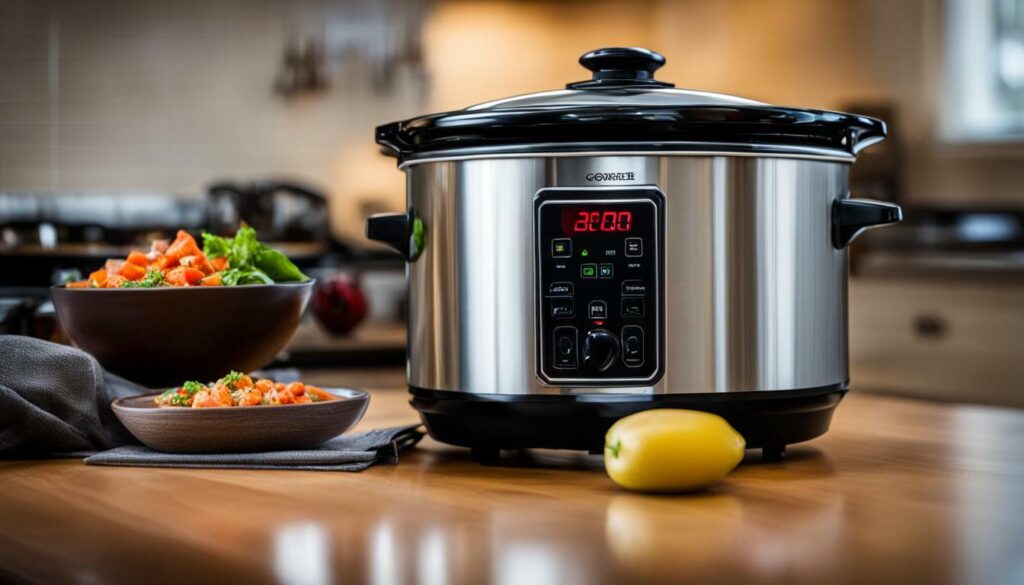
Choose an eco-friendly slow cooker that aligns with your sustainable lifestyle and enjoy energy-efficient and eco-friendly cooking.
Importance of Energy Conservation
As we continue to face the challenges posed by climate change, it has become increasingly important to adopt sustainable practices in our daily lives. Conserving energy is a crucial aspect of this effort, and small slow cookers can play a significant role in reducing our overall energy usage.
By choosing an energy-efficient slow cooker, you can minimize the impact of your cooking on the environment while still enjoying delicious meals. These appliances are designed to consume low energy, making them a perfect fit for eco-conscious households. In fact, compared to traditional ovens and stovetops, slow cookers use only a fraction of the energy, reducing your carbon footprint and contributing to a more sustainable lifestyle.
Additionally, opting for energy-saving kitchen appliances like small slow cookers can lead to cost savings over time. By consuming less energy, these appliances can help you lower your utility bills and allocate your savings towards other household expenses.
In conclusion, energy conservation is essential in today’s world, and small slow cookers can help us achieve this goal while still providing delicious meals. By choosing an energy-efficient slow cooker, we can reduce our energy consumption, lower our carbon footprint, and contribute to a more sustainable future.
Conclusion
Small slow cookers are an excellent choice for anyone looking to cook delicious and healthy meals while minimizing energy usage. By analyzing their energy efficiency, we have seen how they stack up against other kitchen appliances and how their eco-friendly benefits make them a great addition to any sustainable lifestyle.
Through features such as programmable timers, temperature control, and insulation, small slow cookers are designed to optimize energy usage and reduce overall energy consumption in the kitchen. Additionally, by utilizing practical tips such as meal planning and proper portion sizes, users can further maximize their energy savings while still enjoying delicious meals.
The importance of energy conservation cannot be overstated, and small slow cookers offer a practical solution for reducing energy usage and minimizing your environmental impact. By investing in an energy-efficient slow cooker, you can enjoy delicious meals while contributing to a more sustainable future.
Small Slow Cooker Energy Usage: A Key Factor in Sustainable Cooking
Overall, small slow cookers offer an energy-efficient and eco-friendly cooking solution that can benefit both individuals and the environment. By choosing a slow cooker, you can minimize your energy usage in the kitchen and reduce your carbon footprint. So why not invest in a small slow cooker today and start enjoying delicious, sustainable meals?
FAQ
Q: What is the energy efficiency of small slow cookers?
A: Small slow cookers are designed to consume low energy while providing convenient and eco-friendly cooking solutions. They are energy-efficient appliances that help reduce energy usage in the kitchen.
Q: What are small slow cookers?
A: Small slow cookers are compact kitchen appliances that offer a space-saving solution for smaller kitchens. They deliver excellent cooking performance while taking up less counter or storage space compared to larger models.
Q: How does the energy usage of slow cookers compare to traditional cooking methods?
A: Slow cookers have low energy consumption compared to traditional cooking methods such as ovens, stovetops, and microwaves. They contribute to overall energy savings in the kitchen and are considered an energy-saving option.
Q: What energy efficiency features do small slow cookers have?
A: Small slow cookers are equipped with energy efficiency features such as programmable timers, temperature control, and insulation. These features help optimize energy usage and promote energy-efficient cooking.
Q: What factors can affect energy consumption in small slow cookers?
A: Factors that can impact energy consumption in small slow cookers include using the right cooking settings, proper ingredient preparation, and maximizing energy efficiency while maintaining delicious results.
Q: How do small slow cookers compare to other kitchen appliances in terms of energy usage?
A: Small slow cookers have lower energy consumption compared to ovens, stovetops, and microwaves. They are an energy-saving option for certain cooking scenarios and can help reduce overall energy usage in the kitchen.
Q: What are some tips for energy-efficient slow cooking?
A: To maximize the energy efficiency of your slow cooker, consider meal planning, proper portion sizes, and utilizing the residual heat of the appliance for additional energy savings. These practices contribute to energy-efficient cooking.
Q: How do small slow cookers contribute to eco-friendly cooking solutions?
A: Small slow cookers have a lower carbon footprint compared to traditional cooking methods. Their energy efficiency aligns with sustainable kitchen practices, making them an eco-friendly cooking appliance.
Q: Why is energy conservation important, and how do small slow cookers play a role?
A: Energy conservation is crucial for a more sustainable lifestyle. Small slow cookers, with their low energy consumption and eco-friendly features, contribute to reducing energy usage and promoting energy-saving practices in the kitchen.
Q: What have we learned about the energy efficiency of small slow cookers?
A: In conclusion, small slow cookers are energy-efficient appliances that consume low energy while providing convenient and eco-friendly cooking solutions. They have various features and factors that contribute to their energy efficiency, helping to minimize energy usage in the kitchen and reduce environmental impact.



